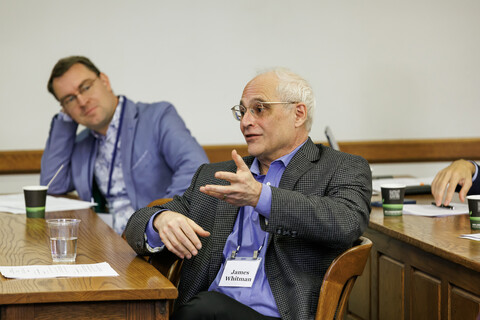Scholars Convene to Honor Professor James Whitman

On Oct. 13–14, Yale Law School hosted a conference in honor of James Q. Whitman ’88, the Ford Foundation Professor of Comparative and Foreign Law. The conference, titled “Comparative Legal History: A Conference on Themes in the Work of James Whitman,” convened scholars from around the globe for a series of panel discussions.
The conference began with welcome remarks from Dean Heather K. Gerken, who described Whitman as a path-breaking thinker in the fields of comparative law and European legal history
“Jim is a scholar’s scholar who fuses a wide-ranging intelligence with a deep devotion to the historian’s craft,” Gerken said. “He is an unfailingly insightful commentator and a devoted colleague.” Whitman, she added, “embodies the very best values of academic life and the highest aspirations of this Law School.”
Whitman exemplifies a rare talent for thinking across disciplinary boundaries while retaining a pragmatic focus, Gerken said. She recounted the astounding range of fields — from theology to art law — that Whitman has drawn upon in his scholarship. She noted that an early book of Whitman’s, Harsh Justice: Criminal Punishment and the Widening Divide between America and Europe (Oxford University Press, 2003), was among the first scholarly works to address mass incarceration.
Gerken also recognized Whitman’s most recent title, Hitler’s American Model: The United States and the Making of Nazi Race Law (Princeton University Press, 2017), which examines how the Nazi regime drew inspiration from the U.S. system of racial oppression. In other books, Whitman has traced the influence of Roman law on the German Romantic era and argued that theology underpins modern conceptions of “reasonable doubt.” His writing, which also includes dozens of journal articles, has been published in eight languages.

Friday featured four panels on the topics of “Criminal Justice,” “Comparativism and the Modern State,” “Roman Law and its Legacy,” and “Law and Theology.” Saturday featured two panels, titled “Comparative Law Methods” and “War and Empire.” Panelists included Yale Law School alumni Christian Burset ’14, Charlie Donahue ’65, Amalia Kessler ’99, Adriaan Lanni ’99, Andrea McDowell ’98, Intisar A. Rabb ’06, Noah Rosenblum ’17, Katharina Isabel Schmidt ’13 LLM, Taisu Zhang ’08, and Wang Zhiqiang ’14 JSD.
Zhang and Law School faculty members William K. Townsend Professor of Law Nicholas Parrillo ’04 and Simeon E. Baldwin Professor Claire Priest ’00 served as moderators.
“The conference was a deeply enriching, historic event,” said Priest. “James Whitman is one of the great legal historians of our time, and the success of the conference was a testament to his broad-ranging, rigorous, and creative body of work.”
The panelists discussed their recent work on themes ranging from criminal justice to law and war, law and theology, and comparative law. Each contribution recognized the influence of Whitman’s thought and teaching. A forthcoming issue of the Yale Journal of Law and the Humanities will publish the papers in a symposium edition.
Whitman’s association with Yale Law School spans four decades, stretching back to his student days. When Whitman graduated from Yale Law School in 1988, he added his J.D. to an already exemplary CV. He had previously earned a Ph.D. in Intellectual History from the University of Chicago; an M.A. in European History from Columbia University; and a B.A. in Comparative Literature from Yale College.
After law school, Whitman clerked for Judge Ralph K. Winter ’60 of the U.S. Court of Appeals for the Second Circuit. He began his academic career as a Professor of Law at Stanford Law School, where he taught from 1989 to 1994. Whitman joined the Yale Law School faculty in 1994, first as Professor of Law. He has held the Ford Foundation Professorship of Comparative and Foreign Law since 1996.
Gerken closed by honoring Whitman’s role as a formative mentor to generations of Yale Law School students. “Jim’s work would be enough — more than enough — to earn this gathering,” she told conference attendees. “But I know that what ties you together is not just admiration for Jim, but affection. He carries on the great traditions of the academy not just in what he writes, but in how he trains the scholars who follow him.”
The conference was supported by the Oscar M. Ruebhausen Fund at Yale Law School.


